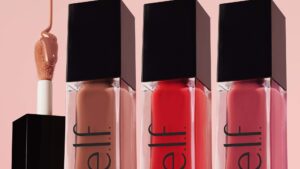E.l.f. Beauty: A Closer Look at Recent Stock Controversies and Strategic Growth
In a recent interview with Jim Cramer on CNBC, Tarang Amin, the CEO of E.l.f. Beauty, robustly defended the cosmetics company against allegations made by the hedge fund Muddy Waters. This high-profile firm claimed that E.l.f. had been overstating revenues, a charge Amin called “absolute nonsense.”
The Bursting of Short Seller Myths
Amin emphasized the company’s strong financial performance as a counterpoint to these accusations. “We just finished our 23rd consecutive quarter of net sales and market share growth, and our company is extremely healthy,” he stated. These words reflect not only confidence but also an underlying strategy that sets E.l.f. apart in a competitive market.
Muddy Waters had claimed to short E.l.f.’s stock based on allegations that the company had inflated its inventory numbers. Their arguments centered around the idea that E.l.f. was manipulating financial statements to the detriment of shareholders. However, Amin countered by pointing to the company’s rigorous controls on inventory and revenue recognition—factors that he suggests have been crucial in E.l.f.’s success.
Strong Performance Amidst Industry Challenges
The cosmetics industry as a whole has faced challenges in an economy where consumers are increasingly price-sensitive. Yet, E.l.f.’s strategic focus on affordable products has allowed it to transcend these hurdles. With a staggering 91% increase in international business last quarter, E.l.f. has not only maintained but expanded its market share, reassuring shareholders and attracting new consumers who are looking for quality products at accessible prices.
Additionally, Amin noted that the company’s digital marketing campaigns have gone viral, illustrating E.l.f.’s unique approach to engaging consumers. This innovative marketing strategy is an essential element of E.l.f.’s growth narrative, demonstrating that the company knows how to harness contemporary trends to boost its visibility and sales.
Transparency vs. Confidentiality: What’s Really Happening?
Muddy Waters argues that their claims are validated by conversations with some of E.l.f.’s major suppliers, suggesting a decline in orders due to inventory management issues. Amin rebuffed this, mentioning that they had requested U.S. Customs and Border Protection to keep their import data confidential for “competitive reasons,” hinting at an active approach to safeguarding company information from competitors who might exploit it.
When analyzing these dynamics, it becomes apparent that the landscape of investing is fraught with complexities. Short sellers often seek to capitalize on perceived weaknesses in a firm, which they believe will lead to declining stock values. However, E.l.f.’s demonstrated resilience raises questions about the reliability of such claims and the long-term consequences they could have on the company’s stock performance.
Unique Insights from Extreme Investor Network
At Extreme Investor Network, we believe it’s not just about the numbers but also about strategy, transparency, and the ability to adapt to the market landscape. E.l.f.’s case serves as an excellent lesson for investors. It showcases the importance of understanding market dynamics, recognizing strong management practices, and being wary of rumors propagated by short sellers.
While successful companies do encounter challenges, their ability to leverage consumer trends, maintain operational integrity, and innovate effectively will ultimately shape their futures. As investors, it’s crucial to discern between the noise and genuine insights that can help define your investment strategy. E.l.f. Beauty appears poised for continued success, but as always, due diligence is the key to navigating the ever-changing world of investments.
By staying updated and informed, readers can navigate stock market complexities with confidence, ensuring informed decisions. Join us at Extreme Investor Network for more insights and strategies to enhance your investment journey!

